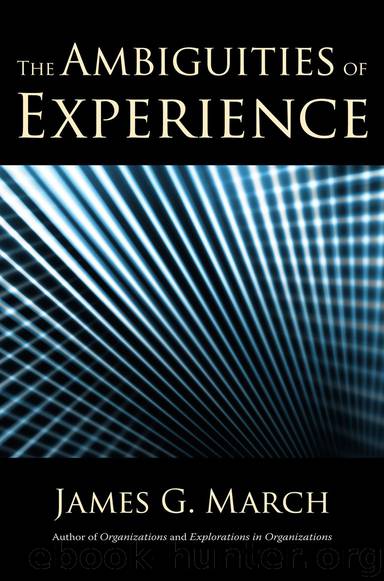The Ambiguities of Experience (Messenger Lectures) by James G. March

Author:James G. March [March, James G.]
Format: mobi
ISBN: 9780801457777
Publisher: Cornell University Press
Published: 2011-03-29T04:00:00+00:00
5
THE LESSONS
OF EXPERIENCE
Learning from experience in organizations is both an important phenomenon and a large industry. Business schools, publishers, publications, and consultants offer advice to business firms in parallel with an overlapping collection of schools, publishers, publications, and consultants specializing in public-sector organizations. To some extent, the groups flourish by equating improvement with learning, thus making the proposition that learning is a good thing into a tautology, but they provide ideas about how to achieve a “learning organization,” by which they mean an organization that uses mechanisms of learning to improve the return from actions. Some of the ideas come from research, some from experience, some from analysis, and some from various forms of personal imagination. They all seek to provide clues to improving organizational adaptiveness.
The efforts reflect a widespread belief that organizations need to improve their capabilities for comprehending and adapting to their environments (Argyris and Schön 1978; Etheredge 1985; Olsen and Peters 1996). The strategies for doing so include exploiting the learning found in academic theories of management and organization as translated and advocated by the purveyors of organizational advice. They also include developing capabilities for reacting intelligently to the lessons of direct experience. In this tradition, failures to improve intelligence through experience are due to human faults that are correctable through education and training.
The previous chapters have provided a few footnotes to those beliefs and efforts. They have explored some selected aspects of the possibilities, ambiguities, and problems of learning from experience. At the risk of using a few words to communicate what more words have already said, four general conclusions might be suggested.
• First, organizations and the people in them seek intelligence by modifying their expectations and understandings on the basis of the actions they take and the outcomes they observe. They learn both through low-intellect mechanisms that simply replicate successful actions, routines, or forms and also through high-intellect mechanisms that develop theories, models, and stories of history. Modifications in behaviors and understandings on the basis of experience are conspicuous aspects of human existence.
• Second, these mechanisms lead to palpable improvements in domains of relatively constrained activities that are repeated frequently. In such situations, the experience gained from repetitive practice frequently improves performance, although it ordinarily does not lead to an optimum, is subject to inadequate experimentation, and has limited generalizability.
• Third, in situations involving more complex causal relationships and fewer repetitions, experience is not a good teacher in the sense of reliably providing a clear basis for improvement in performance. However, in combination with the mythic themes provided by models and accepted story themes, the interpretation of experience develops conversational agreement, a sense of comprehension, a certification of the primacy of the human intellect, and (sometimes) a modicum of aesthetic achievement.
• Fourth, learning from experience requires experimentation for its long-run effectiveness but tends to extinguish it. Novelty is habitually vulnerable to effective learning. Nevertheless, novelty does arise in organizations and can, to a limited extent, be engineered.
EXPERIENCE AS A USEFUL TEACHER
There is no question that
Download
This site does not store any files on its server. We only index and link to content provided by other sites. Please contact the content providers to delete copyright contents if any and email us, we'll remove relevant links or contents immediately.
Bad Blood by John Carreyrou(6599)
Rich Dad Poor Dad by Robert T. Kiyosaki(6575)
Principles: Life and Work by Ray Dalio(6379)
Playing to Win_ How Strategy Really Works by A.G. Lafley & Roger L. Martin(6179)
Management Strategies for the Cloud Revolution: How Cloud Computing Is Transforming Business and Why You Can't Afford to Be Left Behind by Charles Babcock(4558)
The Confidence Code by Katty Kay(4237)
Thinking in Bets by Annie Duke(4203)
American Kingpin by Nick Bilton(3856)
Delivering Happiness by Tony Hsieh(3408)
Project Animal Farm: An Accidental Journey into the Secret World of Farming and the Truth About Our Food by Sonia Faruqi(3207)
The Power of Habit by Charles Duhigg(3116)
The Tyranny of Metrics by Jerry Z. Muller(3048)
Brotopia by Emily Chang(3035)
Mastering Bitcoin: Programming the Open Blockchain by Andreas M. Antonopoulos(3028)
The Marketing Plan Handbook: Develop Big-Picture Marketing Plans for Pennies on the Dollar by Robert W. Bly(3026)
I Live in the Future & Here's How It Works by Nick Bilton(2975)
The Content Trap by Bharat Anand(2908)
Applied Empathy by Michael Ventura(2882)
Building a StoryBrand by Donald Miller(2881)
